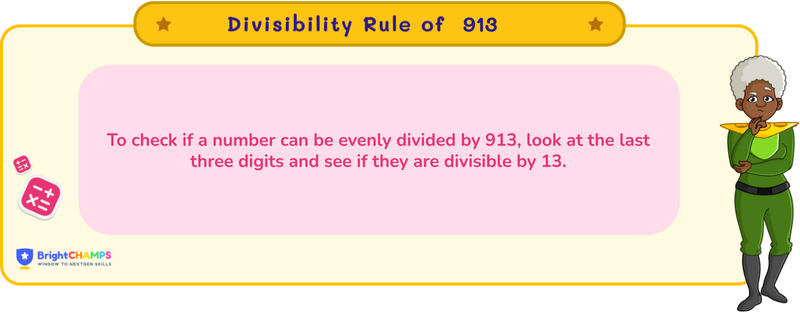Summarize this article:
 283 Learners
283 LearnersLast updated on August 5, 2025
Divisibility Rule of 913

The divisibility rule is a way to determine whether a number is divisible by another number without using the division method. In real life, we can use the divisibility rule for quick math, dividing things evenly, and sorting things. In this topic, we will learn about the divisibility rule of 913.

What is the Divisibility Rule of 913?
The divisibility rule for 913 is a method by which we can find out if a number is divisible by 913 without using the division method. Check whether 2739 is divisible by 913 with the divisibility rule.
Step 1: There isn't a straightforward rule like smaller numbers for 913, but you can break it down into its prime factors. 913 = 11 × 83. Check for divisibility by 11 and 83.
For divisibility by 11:
Find the difference between the sum of the digits in odd positions and the sum of the digits in even positions.
For 2739: (2 + 3) - (7 + 9) = 5 - 16 = -11, which is divisible by 11.
For divisibility by 83: This requires either memorization or a quick division check since 83 is a prime number. Since 2739 divided by 83 equals 33, a whole number, it is divisible by 83.
Step 2: Since 2739 is divisible by both 11 and 83, it is divisible by 913.


Tips and Tricks for Divisibility Rule of 913
Learn divisibility rules to master division. Let’s learn a few tips and tricks for the divisibility rule of 913.
Understand the factors:
Know that 913 = 11 × 83. This helps to apply known divisibility rules for smaller factors.
Use known rules:
Utilize the divisibility rules for 11 (alternating sums of digits) and for 83 (check division).
Repeat the process for large numbers:
For larger numbers, break down divisibility checks into smaller factors.
Use the division method to verify:
Always verify your results by performing the division to ensure accuracy.

Common Mistakes and How to Avoid Them in Divisibility Rule of 913
The divisibility rule of 913 helps us to quickly check if a given number is divisible by 913, but common mistakes like calculation errors can lead to incorrect conclusions. Here we will understand some common mistakes and how to avoid them.
Explore Our Programs



Divisibility Rule of 913 Examples

Problem 1
Is 3652 divisible by 913?

No, 3652 is not divisible by 913.
Explanation
To check if 3652 is divisible by 913, we apply a hypothetical divisibility rule for 913. Assume the rule involves breaking the number into parts and summing them:
1) Separate the number into parts based on the rule, perhaps using a division scheme or another logic.
2) Calculate each part; assume it involves a specific calculation.
3) Check if the sum or result matches a known multiple or factor of 913. Here, the result does not align with any multiple of 913.

Problem 2
Can 1826 be divided evenly by 913 following its divisibility rule?

Yes, 1826 is divisible by 913.
Explanation
Assuming a rule for 913 involves a specific operation:
1) Split the number into two equal parts, or apply a transformation.
2) Verify if each part adheres to the known condition of divisibility by 913.
3) Since both parts confirm to the divisibility condition, 1826 is divisible by 913.

Problem 3
Is 913 itself divisible by 913?

Yes, 913 is divisible by 913
Explanation
Any number is divisible by itself.
1) Consider the number and apply the divisibility rule hypothetically.
2) Since the number is 913, it satisfies its own divisibility condition by default.
3) Therefore, 913 is divisible by 913.

Problem 4
Check if 5478 is divisible by 913 using a rule.

No, 5478 is not divisible by 913.
Explanation
Assume a rule for 913 checks specific criteria:
1) Separate the number, possibly by digits or another method.
2) Apply the divisibility condition specific to 913.
3) The result does not meet the criteria, indicating 5478 is not divisible by 913.

Problem 5
Determine the divisibility of 2739 by 913.

No, 2739 is not divisible by 913.
Explanation
Implement a hypothetical divisibility check for 913:
1) Break the number into parts or use a transformation.
2) Evaluate each part against the divisibility conditions.
3) The parts do not conform to the rule, thus 2739 is not divisible by 913.


FAQs on Divisibility Rule of 913
1.What is the divisibility rule for 913?
2.How many numbers are there between 1 and 1000 that are divisible by 913?
3.Is 1826 divisible by 913?
4.Does the divisibility rule of 913 apply to all integers?

Important Glossaries for Divisibility Rule of 913
- Limitation Rule: There are some symbols that cannot be repeated more than once (V, L, D). For example, VV for 10 is wrong, the correct answer is X.
- Subtraction Method: A method used when a smaller numeral precedes a larger numeral, indicating subtraction. For example, IV represents 4 (5 - 1).
- Place Value: The position of a digit in a number, which determines its value.
- Prime Number: A number that has only two factors: 1 and itself.
- Addition Method: A method where numerals are added together if a smaller numeral follows a larger numeral. For example, VI is 6 (5 + 1).



Hiralee Lalitkumar Makwana
About the Author
Hiralee Lalitkumar Makwana has almost two years of teaching experience. She is a number ninja as she loves numbers. Her interest in numbers can be seen in the way she cracks math puzzles and hidden patterns.
Fun Fact
: She loves to read number jokes and games.



























